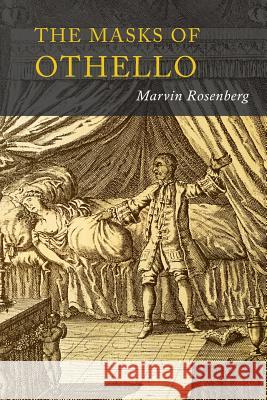Masks of Othello: The Search for the Identity of Othello, Iago, and Desdemona by Three Centuries of Actors and Critics » książka
Masks of Othello: The Search for the Identity of Othello, Iago, and Desdemona by Three Centuries of Actors and Critics
ISBN-13: 9781684220205 / Angielski / Miękka / 2016 / 328 str.
Masks of Othello: The Search for the Identity of Othello, Iago, and Desdemona by Three Centuries of Actors and Critics
ISBN-13: 9781684220205 / Angielski / Miękka / 2016 / 328 str.
(netto: 82,28 VAT: 5%)
Najniższa cena z 30 dni: 85,45
ok. 16-18 dni roboczych.
Darmowa dostawa!
2016 Reprint of 1961 Edition. Full facsimile of the original edition, not reproduced with Optical Recognition Software. In what is now considered a classic study, noted Shakespearean Marvin Rosenberg sets out to discover how the complex, troubled characters of the play have been interpreted by actors and critics from Shakespeare's time to the present. Rosenberg's study of the successive stage editings of Othello--some of them to reduce playing time, others demanded by the taste and moral sense of each new age--provides a running commentary of social and cultural history, and shows how those cuttings affected, as well as revealed, the actors' concepts of the characters. "Othello" is the most erotic, the most sensual in language and imagery of the tragedies, and its heavily sexual atmosphere, so suitable to the seventeenth century, offended later cultures. The eighteenth century tried to "refine" it, and the nineteenth, particularly the age of Victoria, to refine it even further, but the essential form of the play survived.--From the Dust Jacket. Contents: Part. 1. The beginning. The actor's share -- Othello in the Restoration -- pt. 2. The eighteenth century -- The eighteenth century actors -- pt. 3. The nineteenth century. Kean -- Mcready, Fechter, Irving -- Booth -- Forrest -- Salvini -- The Victorian Iago -- The Victorian Desdemona -- pt. 4. The twentieth century. The modern Othello -- The modern Iago -- pt. 5. Othello and the critics. In defense of Iago -- In defense of Othello -- In defense of Desdemona -- In defense of the play: I -- In defense of the play: II -- Appendix: A kind word for Bowdler.
2016 Reprint of 1961 Edition. Full facsimile of the original edition, not reproduced with Optical Recognition Software. In what is now considered a classic study, noted Shakespearean Marvin Rosenberg sets out to discover how the complex, troubled characters of the play have been interpreted by actors and critics from Shakespeare's time to the present. Rosenberg’s study of the successive stage editings of Othello—some of them to reduce playing time, others demanded by the taste and moral sense of each new age—provides a running commentary of social and cultural history, and shows how those cuttings affected, as well as revealed, the actors’ concepts of the characters. “Othello” is the most erotic, the most sensual in language and imagery of the tragedies, and its heavily sexual atmosphere, so suitable to the seventeenth century, offended later cultures. The eighteenth century tried to “refine” it, and the nineteenth, particularly the age of Victoria, to refine it even further, but the essential form of the play survived.—From the Dust Jacket.Contents: Part. 1. The beginning. The actor's share -- Othello in the Restoration -- pt. 2. The eighteenth century -- The eighteenth century actors -- pt. 3. The nineteenth century. Kean -- Mcready, Fechter, Irving -- Booth -- Forrest -- Salvini -- The Victorian Iago -- The Victorian Desdemona -- pt. 4. The twentieth century. The modern Othello -- The modern Iago -- pt. 5. Othello and the critics. In defense of Iago -- In defense of Othello -- In defense of Desdemona -- In defense of the play : I -- In defense of the play : II -- Appendix : A kind word for Bowdler.











